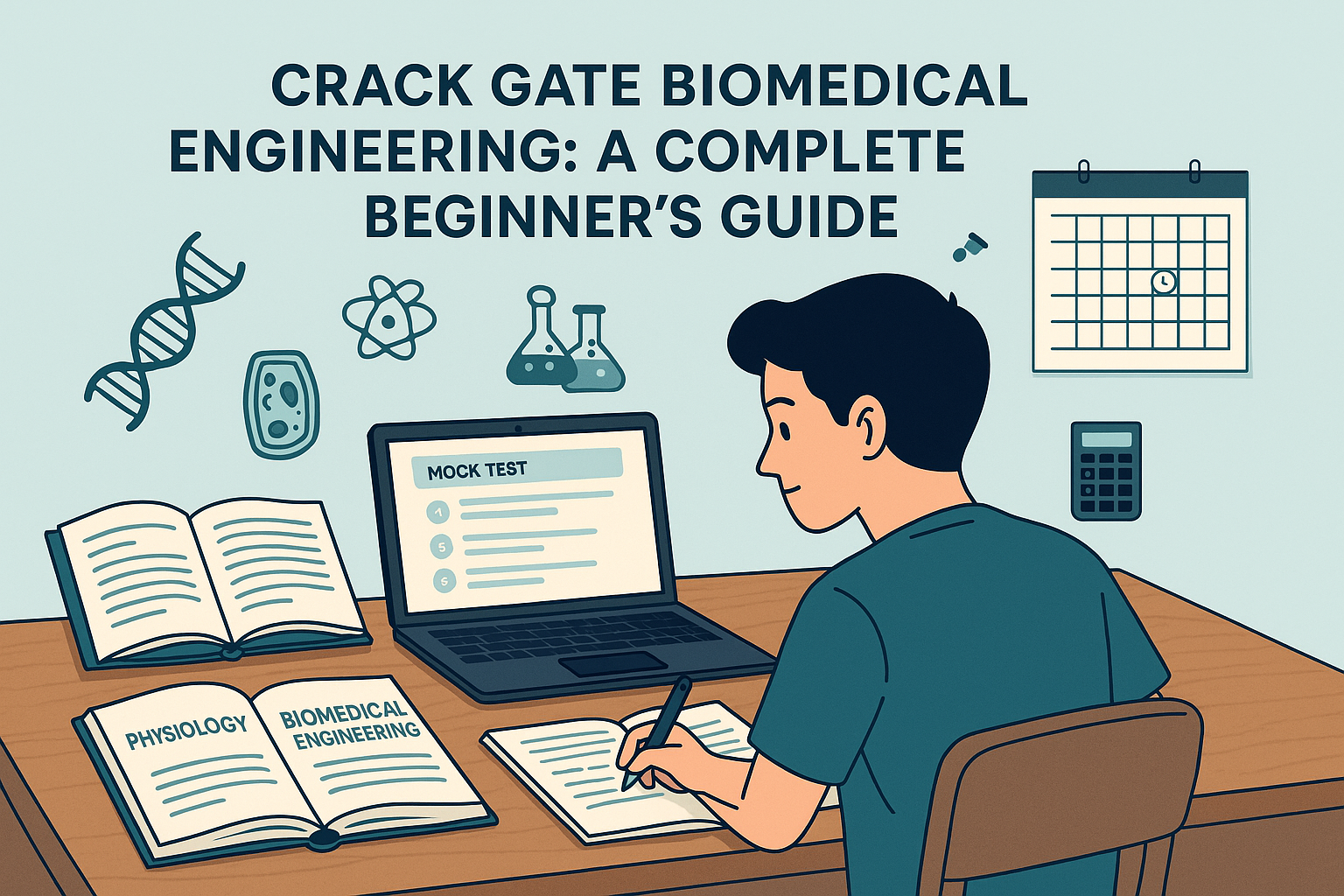Introduction
The GATE Biomedical Engineering (BM) paper has opened new doors for students passionate about life sciences, technology, and healthcare. Whether you’re aspiring for a seat in prestigious institutes like IITs/IISc or planning for a career in research and PSUs, cracking GATE Biomedical Engineering is a must.
But what if you’re just starting out and don’t know how to begin? Don’t worry—this complete beginner’s guide is your one-stop solution for cracking GATE BM from scratch.
What is GATE Biomedical Engineering?
GATE (Graduate Aptitude Test in Engineering) is a national-level entrance exam that tests the technical knowledge and aptitude of candidates in various engineering disciplines.
Biomedical Engineering (BM) was introduced as a separate GATE paper to cater to the interdisciplinary field that merges engineering principles with medical and biological sciences.
Key Opportunities After GATE BM:
M.Tech/M.E./MS in Biomedical Engineering
Research roles in DRDO, ISRO, CSIR, DBT, and ICMR labs
PSU jobs (limited but growing)
Junior Research Fellowships (JRF) and PhD admissions
Higher studies abroad (some foreign universities accept GATE)
GATE Biomedical Engineering Exam Pattern
Section Marks
General Aptitude 15 Marks
Biomedical Engineering 85 Marks
Total 100 Marks
Duration 3 Hours
Mode Computer-Based Test (CBT)
Question Types MCQ, MSQ, NAT
Marking Scheme:
MCQs: +1 or +2 marks with negative marking
NAT & MSQs: No negative marking
GATE Biomedical Engineering Syllabus
Here’s a simplified breakdown of the syllabus:
Biomedical Engineering Core Topics:
Human Physiology
Biomedical Signals and Systems
Biomedical Instrumentation
Analog and Digital Electronics
Medical Imaging Systems
Sensors and Measurement Techniques
Biomaterials and Artificial Organs
Engineering Mathematics:
Linear Algebra, Calculus, Differential Equations
Probability and Statistics
Transform Theory (Laplace, Fourier)
General Aptitude:
Verbal Reasoning
Numerical Ability
Logical Thinking
Tip: Download the official syllabus PDF from the GATE website and highlight each topic as you complete it.
Step-by-Step Preparation Plan for Beginners
1. Understand the Weightage
Not all topics carry equal importance. Analyze previous year papers to see which chapters are frequently tested.
Subject Area Approx. Weightage
Human Physiology 10-12%
Signals & Systems 12-15%
Instrumentation 15-20%
Imaging Techniques 8-10%
Electronics 10%
Biomaterials 5-8%
Engineering Math 10-13%
2. Build Your Conceptual Foundation
Since GATE BM is interdisciplinary, you must:
Revise core biomedical concepts from UG.
Learn key mathematical tools for signal processing and modeling.
Strengthen your understanding of analog and digital circuits.
Pro Tip: Use animated videos (e.g., NPTEL, YouTube) to visualize physiological and imaging processes.
3. Choose the Right Study Materials
Recommended Books:
Subject Book Recommendation
Human Physiology Guyton & Hall / Vander
Biomedical Instrumentation R.S. Khandpur
Signals & Systems Oppenheim & Willsky
Electronics Sedra & Smith
Medical Imaging Rangayyan
Biomaterials Sujata V. Bhat
Engineering Math B.S. Grewal / Erwin Kreyszig
Also refer to GATE IIT study materials, toppers’ notes, and subject-specific handbooks.
4. Create a Personalized Study Plan
6-Month Plan for Beginners
Month Focus Areas
1 Engineering Mathematics + Physiology
2 Signals, Systems, and Instrumentation
3 Electronics + Imaging Techniques
4 Biomaterials + Aptitude + Mock Tests
5 Previous Year Questions + Revisions
6 Full-length Mock Tests + Error Log
Include buffer weeks for backlog topics.
5. Practice Previous Year Papers
Solve at least 10 years of GATE BM and allied papers (EC, IN).
Use resources like NPTEL, BiomedGATE, or GATE IIT practice books.
Focus on understanding why an option is right or wrong.
Smart Tips to Crack GATE BM in First Attempt
1. Focus on Numerical Problem Solving
Practice units, equations, and derivations.
Many questions in imaging, instrumentation, and electronics are numerical.
2. Concept > Cramming
GATE tests how well you apply knowledge.
Use concept maps, diagrams, and analogies.
3. Weekly Revisions
Reserve Sundays for revising previously learned content.
Maintain a “Revision Notebook” with formulae and definitions.
4. Take Mock Tests Seriously
Start with topic-wise tests → sectional tests → full-length mocks.
Use portals like GATE IIT, Testbook, or Made Easy.
Stay Motivated and Avoid Burnout
Study in short intervals (Pomodoro Technique)
Track your progress visually (calendars, habit trackers)
Join study groups on Telegram, Discord, or WhatsApp
Use flashcards and spaced repetition tools (like Anki)
Scope After Cracking GATE Biomedical Engineering
Higher Education Opportunities:
IITs: Delhi, Bombay, Madras, Kharagpur, Hyderabad
IISc Bangalore: Renowned for biomedical signal processing
NITs: NIT Rourkela, NIT Trichy, NIT Raipur
Research Opportunities:
CSIR Labs, DRDO, ICMR, DBT
Junior Research Fellowships (JRF)
PSU Jobs:
Though limited, some organizations recruit via GATE BM score:
BARC
BEL
CDAC
AIIMS research projects
International Scope:
Some European and Asian universities accept GATE score
Strong foundation for GRE/TOEFL-based admissions
How GATE IIT Helps in GATE BM Preparation
GATE IIT, a trusted name in competitive coaching, offers specialized training for GATE Biomedical Engineering aspirants.
Why Choose GATE IIT?
Expert Faculty from IITs & IISc
Tailored Study Material for Biomedical Engineering
Regular Mock Tests + Evaluation
Previous Year Paper Solving Sessions
Online & Offline Batch Options


